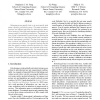Free Online Productivity Tools
i2Speak
i2Symbol
i2OCR
iTex2Img
iWeb2Print
iWeb2Shot
i2Type
iPdf2Split
iPdf2Merge
i2Bopomofo
i2Arabic
i2Style
i2Image
i2PDF
iLatex2Rtf
Sci2ools
ICDE
2005
IEEE
2005
IEEE
Top-Down Specialization for Information and Privacy Preservation
Releasing person-specific data in its most specific state poses a threat to individual privacy. This paper presents a practical and efficient algorithm for determining a generalized version of data that masks sensitive information and remains useful for modelling classification. The generalization of data is implemented by specializing or detailing the level of information in a top-down manner until a minimum privacy requirement is violated. This top-down specialization is natural and efficient for handling both categorical and continuous attributes. Our approach exploits the fact that data usually contains redundant structures for classification. While generalization may eliminate some structures, other structures emerge to help. Our results show that quality of classification can be preserved even for highly restrictive privacy requirements. This work has great applicability to both public and private sectors that share information for mutual benefits and productivity.
Database | ICDE 2005 | Minimum Privacy Requirement | Restrictive Privacy Requirements | Top-down Specialization |
| Added | 01 Nov 2009 |
| Updated | 01 Nov 2009 |
| Type | Conference |
| Year | 2005 |
| Where | ICDE |
| Authors | Benjamin C. M. Fung, Ke Wang, Philip S. Yu |
Comments (0)

